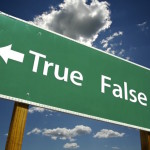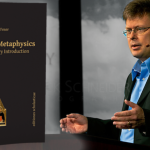Why Objective Morality Does Not Depend on God
by Steven Dillon
Filed under Objective Morality
EDITOR'S NOTE: Today continues our eight-part debate on the resolution, "Does objective morality depend on the existence of God?" We'll hear from two sharp young thinkers. Joe Heschmeyer, a Catholic seminarian in Kansas City, Kansas, will argue the affirmative view. Steven Dillon, a gifted philosopher and a former Catholic seminarian, will argue the negative. The eight parts will run as follows:
Monday (11/4) - Joe's opening statement (affirmative)
Tuesday (11/5) - Steven's opening statement (negative)
Wednesday (11/6) - Joe's rebuttal (affirmative)
Thursday (11/7) - Steven's rebuttal (negative)
Friday (11/8) - Questions exchanged (three questions each)
Saturday (11/9) - Answers (Joe and Steven answer each other's questions)
Sunday (11/10) - Joe's closing statement (affirmative)
Monday (11/11) - Steven's closing statement (negative)
Today we conclude the series with a closing statement from Steven. Both Joe and Steven have agreed to be present in the comment boxes, so if you have a specific question for them, ask away!
Introduction
I’m very grateful to Brandon Vogt and Strange Notions for hosting this debate, and to Joe for participating in it. Debating a Thomist has been refreshing.
Now as I’ve indicated throughout this debate, the resolution is vulnerable to numerous interpretations. But, it has a particularly interesting meaning when uttered by someone of a Thomist persuasion, such as Joe.
“[I]t isn’t atheism per se that threatens the very possibility of morality, at least not directly. Rather, what threatens it is the mechanistic or anti-teleological (and thus anti-Aristotelian) conception of the natural world that modern atheists are generally committed to…”
Objective morality depends on God, for the Thomist, in so far as its underwriting teleology does. But, Aristotle took teleology to be fundamental, thus permitting objective morality to exist independent of God. In a lot of ways, I’ve defended the Aristotelian view in this debate. I’ve argued that morality is ultimately foundational, negating the need for it to depend upon something further. And I resisted Joe’s argument that the teleology of moral duties requires God by showing the argument to be internally inconsistent. Of course, my arguments don’t commit anyone to endorsing Aristotelian metaphysics (though, I’d encourage people to do so), but they’ll play an important role in this closing statement as you’ll soon see.
Let’s review and evaluate the debate so far.
Joe’s Case
Joe’s general strategy for defending the resolution was to argue that objective morality could only be grounded in God, and he presented three arguments to that end. First he argued that normative theories which do not appeal to God are unable to ground objective morality. Second he argued that if God existed and was goodness, then objective morality would be grounded in God. Finally, he argued that objective moral duties required something that only God could deliver: universally binding ends.
In response, I noted that Joe’s general strategy was incapable of evincing the resolution. We could grant everything he said and it would only show that objective morality would be ungrounded in God’s absence. But, an ungrounded objective morality is still objective morality. Furthermore, each of his arguments seemed burdened with problems. For example, his first argument involved a series of questions which do not—contrary to their purpose—indicate whether a normative theory is objective, and as stated above his last involved a set of self-defeating claims.
We did not really interact over these points in the Question and Answer period, so I don’t have much to add here. Perhaps the resolution is true, but it does not seem to me that Joe’s arguments are able to show that it is. However, this could ultimately mean nothing for the purposes of this debate unless my case fared better.
My Case
My general strategy was to argue that objective morality does not depend upon God because some moral propositions belong to the class of propositions that would be true regardless of whether or not God exists. Other members of this class include the laws of logic and mathematical truths. I employed one argument to this end. I argued that the proposition ‘Agony is intrinsically bad’ featured the properties that characterize members of the class of ‘God-independent’ propositions. Namely, I argued that it was necessarily true, fundamental, and did not involve God.
I expected Joe to respond by arguing that there is no evil without goodness and no goodness without God. But, he instead took issue with the truth of the proposition. In his rebuttal, Joe argued that however we understand the ‘badness’ of agony, it won’t allow my proposition to qualify in the class I need it to. Either ‘badness’ just emphasizes the pain of agony—in which case, this isn’t even a moral proposition—or, ‘badness’ refers to moral evil, in which case counter-examples abound wherein agony is either not morally evil, or at least sensibly described as such.
But, ‘badness’ doesn’t just emphasize the pain of agony nor is it just a moral evil. In fact, moral evil is a proper subset of badness. Badness is an enormous category that we all recognize on a daily basis, which is why I’ve been stubborn in explicating this: it seems far too close to experience to need analysis. To illustrate its breadth, badness also includes natural evils. Thus, we tend to think that it’s ‘bad’ when hundreds of children drown after a natural event occurs such as a tsunami striking a village. Badness even transcends actions. We say “I had a bad day”, and “This is just a bad situation.” It is the most fundamental disvalue known to us. So, as we can see, Joe’s counter-examples are not successful. Agony is intrinsically bad, even though it’s not intrinsically morally evil. Note, in using such a broad notion of badness, my proposition is still moral as it concerns evaluative facts that relate to what we should and should not do.
How else did Joe respond to my case? Well, consider the following quotation:
“[Positing ultimately foundational moral truths] is not an answer. It’s a shrug of the shoulders and a “Just because.”
That's not the case in the Christian answer that God is uncaused. We argue that God must exist, since you cannot just have an infinite series of conditional and created beings. For example, St. Thomas Aquinas’ Third Way proves the existence of a Being (who we call God) who must exist necessarily, and who relies only upon Himself for His Being. Without Him, there couldn’t be a universe. We don’t assume that God must exist: we show that He must.”
Those of us who do not believe in God will simply disagree: Christians have not shown that God exists. I’d add that they especially have not done this through Aquinas’ Third Way. If it is sound, it only shows that there is an imperishable substance. We’d definitely need additional argumentation to reasonably infer that this substance is anything like God. Joe may believe it’s a short step from the Third Way to God, but it doesn’t seem like we’ve been given reason to share that sentiment.
Now, because Joe has given an argument for God’s existence, I feel it is permissible for me to respond. In fairness to Joe, I won’t argue in any greater length against the Third Way than his linked video argued for it. You can find my response in footnote.1 I’ve included it there so as not to interrupt the flow here.
In the above quotation Joe indicates that it’s a cop out to say some moral facts are so foundational they’re in no need of being grounded in or by anything. But, I pointed out that this is self-defeating because on his view, the moral fact that there is goodness cannot be grounded in or by anything, since God is goodness and nothing grounds God.
He replied in his Answers section that goodness is—contrary to my suggestion—grounded in God. But, surely this can’t be right. If God is goodness, then to say that goodness is grounded in God is to say that God is grounded in God. If his view commits one to the position that God grounds himself in himself, my view can hardly be regarded as inferior!
So, Joe is suggesting that theists have good reasons to believe in ultimately foundational morality because they’ve got good arguments that God exists (e.g. Aquinas’ Third Way) and is goodness, whereas non-theists lack comparable reasons for endorsing this moral position.
But, what are these arguments for the conclusion that God is goodness? Joe linked us to a video on the Third Way, but up to this point he’d only said that God would be goodness. So, I asked him to provide such an argument. At least this way the readers could decide for themselves whether or not Joe is justified in suggesting that theists are more reasonable than non-theists in endorsing ultimately foundational morality. But, Joe responded by protesting that providing such an argument wasn’t necessary to establish the resolution. However, in so far as he needs to show that God would be goodness in order to show that morality would be grounded in God, he does.
In response, Joe gave us two Fourth Wayish kind of arguments. I’ll leave it to the reader to determine whether these are logically valid and factually correct. I’ve responded to them in [1]: in so far as Aquinas’ Fourth Way implies that Pure Act efficiently causes2, it’s unsound.
The only other issues Joe raised that I’m aware of are about Moral Intuitionism. But, they seem more to do with its practicality than truth, so I’ll set them aside for the time being.
Conclusion
I hope that at the very least I’ve managed to show that non-theists can reasonably resist the resolution. But, my case strikes me as stronger than that. What do you think?
Thanks for reading!
Related Posts
Notes:
- Let’s begin by distinguishing between final and efficient causes.
“Efficient cause = that which by its action makes something to be, or come into being, either in whole or in part.”
“Final cause = that for the sake of which something is made or done. It is the goal, purpose, or end-tended-towards of the efficient cause itself, residing within it and guiding its action.” – Clarke, W. Norris. The One and the Many: A Contemporary Thomistic Metaphysics. Notre Dame, IN: University of Notre Dame, 2001. p. 210
“The efficient cause answers the question: Which being is responsible for this effect’s coming to be? The final cause answers the question: Why did this efficient cause produce this effect rather than that?” Ibid. p. 202
Clarke argues that “every efficient cause needs a final cause to determine its action to produce this effect rather than that” because “If the efficient cause at the moment of its productive action is not interiorly determined or focused toward producing this effect rather than that, then there is no sufficient reason why it should produce this one rather than that.” Ibid. pp. 200-1
Now while Aristotle only thought the unmoved mover/pure actuality was a final cause, Aquinas also thought it was an efficient cause. But, Aristotelian-Thomistic metaphysics make it extremely difficult to say that the Pure Act is an efficient cause.
As Ed Feser says:
“…final causes are prior to or more fundamental than efficient causes, insofar as they make efficient causes intelligible. Indeed, for Aquinas the final cause is “the cause of causes”, that which determines all of the other causes.” Feser, Edward. Aquinas: A Beginner's Guide. Oxford: Oneworld, 2009. p. 18
“[I]n Aquinas’s view an efficient cause can bring an effect into being only if it is “directed towards” that effect and it is ultimately in that sense that the effect is “contained in” the efficient cause.” Ibid. p. 23
But, then it seems that the unmoved mover cannot be an efficient cause because what is Pure Act can have no passive potency and an efficient cause will have passive potency in as much as it is affected by a final cause.
Moreover, due to its Divine Simplicity, Pure Act’s final and efficient causation would have to refer to the same thing: Pure Act. But, final cause logically precedes efficient cause. Therefore, the Pure Act would have to logically precede itself! Hence, Pure Act cannot efficiently cause anything.
In so far as Aquinas’ 5 Ways have the Pure Act being an efficient cause, I think they’re unsound. It seems that adopting Aristotle’s metaphysics (as is eminently reasonable to do) should lead one away from Christianity, not towards it. But, perhaps that’s for another debate. ↩
- Feser says of the manner in which imperfect things participate in God’s goodness in Aquinas’ 4th Way: “Unlike Plato, whose emphasis is exclusively on what later thinkers would call formal causality, Aquinas takes there to be an essential link between participating in something and being efficiently caused by it.” Ibid. p. 108 ↩
Note: Our goal is to cultivate serious and respectful dialogue. While it's OK to disagree—even encouraged!—any snarky, offensive, or off-topic comments will be deleted. Before commenting please read the Commenting Rules and Tips. If you're having trouble commenting, read the Commenting Instructions.













